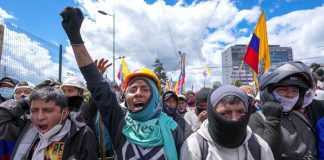The resignation of Pakistani president Pervez Musharraf was greeted with jubilant demonstrations across Pakistan. But it will not remove the tensions within Pakistani politics.
His resignation was followed by the collapse of the ruling coalition, the election of a new president, a US ground incursion into Pakistan and ongoing strikes and demonstrations.
Musharraf’s resignation was a major blow to US control of the region. He has been a supporter of the “war on terror” and the occupation of neighbouring Afghanistan. This support has brought him serious troubles at home, where opposition to the occupation is widespread.
On top of this, Musharraf’s repressive policies inside Pakistan greatly destabilised his rule. He heavy-handedly attempted to control the judiciary, culminating in the dismissal of Chief Justice Iftikhar Muhammad Chaudhry. Lawyers emerged as leaders of several militant anti-Musharraf demonstrations over the last two years.
There is division within the ruling class in Pakistan about how best to conduct the “war on terror”. Some sections, who have their base in Pakistan, want to see a more regulated war. Others, which Musharraf represented, with ties to international capital, want to strengthen the relationship with the US.
Hopes for change
In February, a new ruling coalition came to power, which many hoped would bring change. The coalition comprised the Pakistan People’s Party (PPP) led by Benazir Bhutto’s widower Asif Ali Zardari and the Pakistan Muslim League-Nawaz (PML-N) led by former Prime Minister Nawaz Sharif.
But, somewhat predictably given the political history of the PPP and PML-N—who have both been involved in corruption scandals—their transition to power has delivered little for the mass of people in Pakistan.
If anything, the ruling coalition saw an escalation of the domestic “war on terror”. After the coalition came to power, the military launched a new campaign in the North West frontier, carrying out ground operations and bombing raids.
Up to 700,000 people were displaced and at least 400 killed in the bombing. The death toll continues to rise. The military has established a base in Swat, part of the tribal area, for the first time.
The Pakistani military is using the excuse of the “war on terror” to carry out operations to gain control over previously autonomous regions on the border with Afghanistan.
The region was further destabilised by a US ground incursion into Pakistan. Around 20 civilians died when US forces fired into at least three homes. The Pakistani government lodged a formal complaint with the US over the issue, but is firmly caught between its ongoing support for the occupation of Afghanistan and its need to keep a lid on domestic opposition to the war.
On top of this, there is ongoing economic tension that is hitting the working class and the poor. Karachi has been hit by major strikes in the textile factories and by thousands of council workers. This follows another two week strike at a telecom company.
Recent polls showed 80 per cent of people in Pakistan see the rule of the PPP as a continuation of the Musharraf era. With the resignation of the PML-N from the coalition and the election of PPP leader Zardari, the PPP has consolidated its control—despite Zardari’s personal history of involvement in major corruption scandals.
Sharif hoped that pulling the PML-N out of the government, over differences about how to deal with the lawyers’ movement and the battles in the North West frontier, would destabilise the PPP’s rule. The election of Zardari suggests that the gamble did not go in Sharif’s favour.
But politics in Pakistan remains delicately balanced. The lawyers’ movement and the strike action across Karachi are promising signs for building a real alternative to the agenda of the PPP.
The lack of an anti-war movement is still a significant obstacle to changing the course of events in Pakistan, but there is potential for opposition to unite against Musharraf’s legacy and the conservatism of the PPP.
Masses of people, many of them former supporters of the PPP and PML-N, are disillusioned with the major parties. This disaffection holds the hope for those wishing to see the back of Musharraf’s agenda, just as they have seen the back of Musharraf.
By Ernest Price





